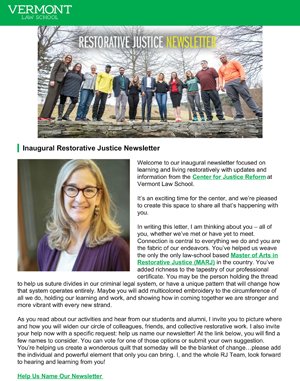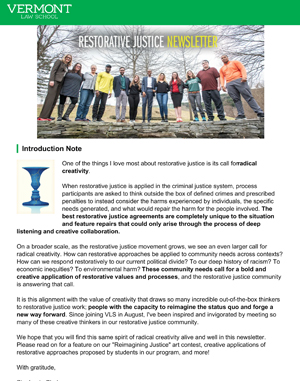Environmental law scholars and editors of the Vermont Journal of Environmental Law (VJEL) at Vermont Law School today announced publication of the "Vermont Law Top 10 Environmental Watch List" for 2020. The list highlights the most pressing environmental issues bearing on law and policy—from climate change, to migration, to cybersecurity—that will shape the coming year.
"As we head into 2020, the upcoming presidential election in the United States looms large… but the planet is indifferent to political shifts or election timelines, and climate change is teetering at its catastrophic tipping point," said Associate Dean and Environmental Law Center Director Jennifer Rushlow in an introduction to the list. "The 10 issues in this year's Watch List are pressure points. They are canaries in the coal mine to watch."
Each item on the Watch List is accompanied by a journal article co-authored by a law student and a law professor. These articles, written with a lay audience in mind, are available online at watchlist.vermontlaw.edu.
The 2020 list includes:
- Moving the Needle on PFAS Regulation
- Indian Country in 2020: Footsteps Worth Following
- EPA Runs from CWA Veto Powers, Spawning New Life for the Pebble Mine Project
- At the Limits of the Law: The Challenge of Invasives in 2020
- Climate Change in the Courts
- Monsanto’s Roundup Litigation in 2020: Restitution for Migrant Farmworkers?
- BLM Director William Perry Pendley's Transfer of Agency Headquarters from Washington to Colorado
- Wrecking Climate Policy and Auto Economics: Trump's Legacy of Fuel Economy Litigation and Car Standard Uncertainty
- The EU-MERCOSUR Deal: A Litmus Test for Resolving the Growing Paradox of Development and Conservation
- Not If, But When: The Environmental Impact of Cybersecurity in the Electric Grid
"Developing the Watch List involves close collaboration between Vermont Law School professors and student editors," explained Dayna Smith JD'20, VJEL editor-in-chief. "Faculty members guide the editors in narrowing down the topics they've brainstormed. They then partner with the editors to develop an article that unravels the legal framework of each issue and explains why it matters."
For more information about the Vermont Journal of Environmental Law, including Top 10 archives, visit vjel.vermontlaw.edu or email daynasmith@vermontlaw.edu. For more information about environmental programs at Vermont Law School, including degrees and clinical training, visit the Environmental Law Center online at vermontlaw.edu/elc.
###
Vermont Law School, a private, independent institution, is home to the nation's premier environmental law program. VLS offers a juris doctor curriculum that emphasizes public service; three environmental master’s degrees—Master of Environmental Law and Policy, Master of Energy Regulation and Law, Master of Food and Agriculture Law and Policy, and a Master of Arts in Restorative Justice; three environmental post-JD degrees —LLM in Energy Law, LLM in Environmental Law, and LLM in Food and Agriculture Law; and an LLM in American Legal Studies for foreign-trained lawyers. The school's Environmental Law Center features innovative experiential programs, including the Environmental Advocacy Clinic, the new Environmental Justice Clinic, the Energy Clinic, and the Food and Agriculture Clinic. For more information, visit vermontlaw.edu, find us on Facebook, and follow us on Twitter and Instagram.


















